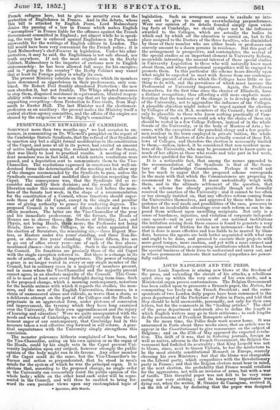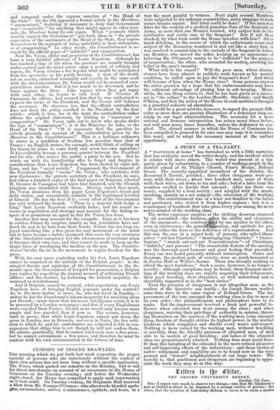,LOUIS NAPOLEON AND THE PRESS.
WM-LE Louis Napoleon is aiming new blows at the freedom of the press, and extending the circuit of his attacks, a rebellious spirt rises up within the very centre of his own circle, and a Ministerial organ proves contumacious. The Belgian Government has been called upon to prosecute a Brussels paper, the Nation, for commenting too freely on the French President; and the corre- spondents of two London daily papers have been summoned to the press department of the Prefecture of Police in Paris, and told that they should be held answerable, personally, not only for their own letters, but for the comments in the "leading articles." The chief of the press department undertook also to define the length to which English writers may go in their criticisms ; to such lengths do the pretensions of President Bonaparte advance !
In the mean time, the Police finds work nearer home. It was announced in Paris about three weeks since, that an article was to appear in the Constitutionnel to give reassurance on the subject of Belgium; and on the 27th of May appeared the expected revela- tion. The drift of it was, that in fostering journals, foreign as well as native, adverse to the French Government, the Belgian Go- vernment had forfeited its neutrality; that King Leopold was not to blame, since, next to Queen Victoria, he has the misfortune to be the most strictly constitutional Monarch in Europe, scarcely choosing his own Ministers ; but that the blame was chargeable on the Liberal party, which sympathizes with the Revolutionary party in France; and that the Belgian electors must bear in mind, at the next election, the probability that France would retaliate for the aggressions, not with an invasion of arms, but with a war of tariffs. This threatful paper was not felt to be very reas- suring nor very striking;, and its temporary importance was dying out, when the writer, M. Granier de Cassagnac, revived it, on the 5th of jnne, by declaring that the paper was designed
and composed under the express sanction of "the Head of the State." On the 6th appeared a formal article in the Moniteur, "communiqué," declaring it necessary to deny that Government was " responsible" for anything that might appear in other jour- nals, the Mon iteur being its sole organ. When "journals which usually support the Government" put forth ideas as "the private expression of the sentiments of the Head of the State, they expose themselves to the reproach of being unfaithful in their statements, or of exaggerating." In other words, the Constitutionnel is ac- cused by the official paper of" infidelite" and exaggeration. Now Dr. "Peron, editor and proprietor of the Constitutionnel, has been a very faithful adherent of Louis Napoleon. Although he has reached a time of life when the passions are usually brought under control and the mind enters upon a period of sobriety and repose Dr. Veron retains a fire beyond what might be anticipated from his spectacles or his portly bearing. A man of the world, not an ascetic, embarked resolutely and overtly in the same craft with the chief adventurer, Dr. Veron would not be accused of over- punctilious niceties. But it is too much to be disowned, and he turns against the blow. Like rogues when they get angry with each other, he begins to talk loud. M. Granier de Cassagnac, he affirms, had assured him that he was authorized to express the views of the President, and the Doctor still believes the assurance. Ile observes, too, that the official contradiction does not deny the policy ascribed to the President by the first article : which is true, for in the main the contradiction rather affirms the original statement, by hinting at "inaccuracy or exaggeration." Dr. Veron calls out to know who speaks under the sign of "communiqué"; is it the Ministry, he asks, or the Head of the State ? "It is necessary that the question be solved, precisely on account of the contradiction given by the Moniteur to the Constitutionnel." This is a boldness unknown to states in a condition of freedom less peculiar than that of France : no English writer, for example, would think of calling on the Queen by name to come forth and avow her own signature! It has evidently become a personal quarrel between the President and his ally, who makes the public a party to the row. But he winds up with the humiliating offer to forget and forgive, in consideration that Louis Napoleon has been elected by eight mil- lions, and has "saved society." Unappeased, the Government of the President formally "warns" Dr. Veron ; who retaliates with new disclosures : the private secretary of the President, he says, had taken a hundred copies of the first paper on Belgium, whereof
Granier de Cassagnac had taken four hundred, and the Flemish kingdom was inundated with them. Having stated thus much, Dr. Veron dismisses from his paper Louis Napoleon's friend and daily visitor, and sarcastically submits to the reprimand levelled at himself. He has the best of it ; every effort of the Government has only widened the breach. "There is a majesty doth hedge a king," that Louis Napoleon evidently lacks ; and his recent re- verses in negotiation and strategy may account for the failing re- spect of so prominent an agent as this Dr. Veron has been.
Another fact may account for the escapade. Easy as it has been to subdue France by surprise, tamely as her journalists have suf- fered the pen to be torn from their hands, France has too long en- joyed something like a free press for easy movement of the mind not to have become a habit; insomuch that even the very creatures of the Absolutist conspiracy feel the irksomeness of restraint when it becomes their own case, and they cannot be made to keep up the tragic farce of worshiping the incubus on the pen. The Constitu- tionnel breaks the ice in the movement to regain freedom for the press. With his own press exploding under his feet, Louis Napoleon cannot be surprised at the attitude of the Belgian people : to the mingled threats and eajoleries of the Constitutionnel, to the de- mends upon the Government of Leopold for prosecution, a Belgian jury replies by acquitting the journal accused of criticizing French affairs; and the electors, by reelecting the Liberal majority, de- nounced as revolutionary. And if Belgium cannot be coerced, what expectation can Louis I Napoleon have of bringing English journals under his control ? As to the mere matter of news, he, who has lived in London,— unless he has the Frenchman's inborn incapacity for receiving ideas not French,—must know that wherever intelligence exists it is to be procured by a London newspaper; and that if every Englishman were expelled from France, French news would only become more ample and less guarded than it now is. The events, however, tend to prove, that while Louis Napoleon cannot put down the press in London, nor in Brussels, nor even in Paris, the free criti- cism to which he and his confederates are subjected is felt in con- sequences that oblige him to act though he will not confess them. He admits, practically, that he cannot exist even near a free press : but he cannot exterminate a free press, and therefore he must be content with his own extermination in the fulness of time.



























 Previous page
Previous page